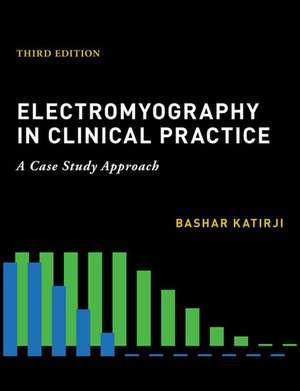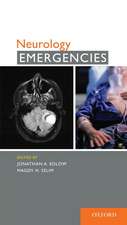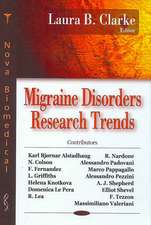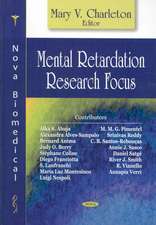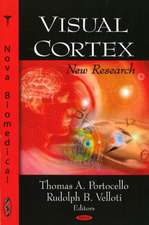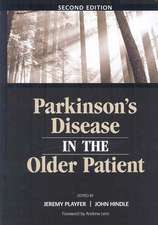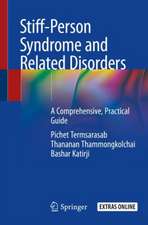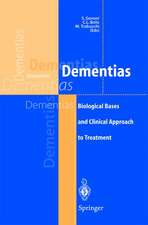Electromyography in Clinical Practice
Autor Bashar Katirjien Limba Engleză Hardback – 8 noi 2018
| Toate formatele și edițiile | Preț | Express |
|---|---|---|
| Hardback (2) | 964.35 lei 6-8 săpt. | |
| Elsevier – 12 sep 2007 | 964.35 lei 6-8 săpt. | |
| Oxford University Press – 8 noi 2018 | 1010.88 lei 31-37 zile |
Preț: 1010.88 lei
Preț vechi: 1266.88 lei
-20% Nou
Puncte Express: 1516
Preț estimativ în valută:
193.46€ • 201.23$ • 159.71£
193.46€ • 201.23$ • 159.71£
Carte tipărită la comandă
Livrare economică 03-09 aprilie
Preluare comenzi: 021 569.72.76
Specificații
ISBN-13: 9780190603434
ISBN-10: 0190603437
Pagini: 480
Dimensiuni: 221 x 282 x 31 mm
Greutate: 1.34 kg
Ediția:3
Editura: Oxford University Press
Colecția OUP USA
Locul publicării:New York, United States
ISBN-10: 0190603437
Pagini: 480
Dimensiuni: 221 x 282 x 31 mm
Greutate: 1.34 kg
Ediția:3
Editura: Oxford University Press
Colecția OUP USA
Locul publicării:New York, United States
Recenzii
Dr. Katirji provides a thorough and practical approach to evaluating common neuromuscular disorders in the electrodiagnostic laboratory with emphasis on recognizing the salient features and discriminating electrophysiological findings of these disorders. This book provides an easily accessible guide that clearly enhances routine clinical electromyography practice.
This third edition is unique, inclusive, and more representative of real cases that are encountered in daily practice, appealing to both budding and experienced electromyographer physicians. Most impressive is each case is approached and discusses in a motivating step by step format, that exactly resemble real life examples, in both academic and private practice. This is essential to the practice of electromyography.
Prof. Katirji has combined his unique combination of neuromuscular practice and electrophysiology in preparing a book with a case based approach. This is a treatise, would benefit both beginners and clinical neurologists. This comprehensive textbook could be an excellent teaching manual.
Electromyography in Clinical Practice is an easy and enjoyable read to the new or more experienced in the field. It can be used as a teaching or self-assessment tool and provides a quick reference and review to topics commonly seen in the neuromuscular and EMG practice. The book is a work of love, reflecting Dr. Katirjis passion in caring for his patients and teaching his students.
This book is a treasure trove of pearls and practical points. The emphasis of clinical correlation to EDX findings is invaluable. The case study format drives home the importance of the history and physical, and how it guides the EDX study to arrive at a logical conclusion. Electromyography in Clinical Practice is an outstanding text for the physician in training as well as the practicing physician.
This third edition is unique, inclusive, and more representative of real cases that are encountered in daily practice, appealing to both budding and experienced electromyographer physicians. Most impressive is each case is approached and discusses in a motivating step by step format, that exactly resemble real life examples, in both academic and private practice. This is essential to the practice of electromyography.
Prof. Katirji has combined his unique combination of neuromuscular practice and electrophysiology in preparing a book with a case based approach. This is a treatise, would benefit both beginners and clinical neurologists. This comprehensive textbook could be an excellent teaching manual.
Electromyography in Clinical Practice is an easy and enjoyable read to the new or more experienced in the field. It can be used as a teaching or self-assessment tool and provides a quick reference and review to topics commonly seen in the neuromuscular and EMG practice. The book is a work of love, reflecting Dr. Katirjis passion in caring for his patients and teaching his students.
This book is a treasure trove of pearls and practical points. The emphasis of clinical correlation to EDX findings is invaluable. The case study format drives home the importance of the history and physical, and how it guides the EDX study to arrive at a logical conclusion. Electromyography in Clinical Practice is an outstanding text for the physician in training as well as the practicing physician.
Notă biografică
Bashar Katirji, MD, FACP has mentored more than 50 fellows in Neuromuscular Disorders & Electromyography, contributed to more than 100 peer-reviewed publications and numerous scientific presentations, and published several leading textbooks. In addition to being actively involved in clinical research, he has a wide and informative personal experience in the use of electrodiagnostic studies for the diagnosis of peripheral nerve and muscle disorders. This experience spans over 35 years.
Cuprins
Introduction to Clinical Electromyography
Nerve Conduction Studies
Needle EMG Examination
Specialized Procedures
Overview of Electromyography Laboratory Procedures and Reporting
Case Studies
Focal Disorders
Case 1: Nerve Injury
Case 2: Ischemic Monomelic Neuropathy
Case 3: Tourniquet Paralysis
Focal Disorders of the Lower Extremity
Case 4: Lumbosacral Radiculopathy
Case 5: Sciatic Neuropathy
Case 6: Femoral Neuropathy
Case 7: Lumbosacral Plexopathy
Case 8: Tarsal Tunnel Syndrome
Case 9: Diabetic Amyotrophy
Case 10: Peroneal Neuropathy
Focal Disorders of the Upper Extremity
Case 11: Ulnar Neuropathy at the Wrist
Case 12: Axillary Neuropathy
Case 13: Cervical Radiculopathy
Case 14: Radial Neuropathy
Case 15: Thoracic Outlet Syndrome
Case 16: Carpal Tunnel Syndrome
Case 17: Ulnar Neuropathy at the Elbow
Case 18: Neuralgia Amyotrophy (Acute Brachial Plexitis)
Generalized Disorders
Case 19: Myasthenia Gravis
Case 20: Chronic Inflammatory Demyelinating Polyneuropathy
Case 21: Amyotrophic Lateral Sclerosis
Case 22: Diabetic Peripheral Polyneuropathy
Case 23: Polymyositis
Case 24: Mononeuropathy Multiplex
Case 25: Lambert-Eaton Syndrome
Case 26: Charcot-Marie-Tooth Disease
Case 27: Myotonic Dystrophy
Case 28: Dorsal Ganglionopathy (Sensory Neuronopathy)
Case 29: Guillian-Barre Syndrome
Case 30: Botulism
Case 31: Hereditary Neuropathy with Liability to Pressure Palsy
Case 32: Multifocal Motor Neuropathy
Nerve Conduction Studies
Needle EMG Examination
Specialized Procedures
Overview of Electromyography Laboratory Procedures and Reporting
Case Studies
Focal Disorders
Case 1: Nerve Injury
Case 2: Ischemic Monomelic Neuropathy
Case 3: Tourniquet Paralysis
Focal Disorders of the Lower Extremity
Case 4: Lumbosacral Radiculopathy
Case 5: Sciatic Neuropathy
Case 6: Femoral Neuropathy
Case 7: Lumbosacral Plexopathy
Case 8: Tarsal Tunnel Syndrome
Case 9: Diabetic Amyotrophy
Case 10: Peroneal Neuropathy
Focal Disorders of the Upper Extremity
Case 11: Ulnar Neuropathy at the Wrist
Case 12: Axillary Neuropathy
Case 13: Cervical Radiculopathy
Case 14: Radial Neuropathy
Case 15: Thoracic Outlet Syndrome
Case 16: Carpal Tunnel Syndrome
Case 17: Ulnar Neuropathy at the Elbow
Case 18: Neuralgia Amyotrophy (Acute Brachial Plexitis)
Generalized Disorders
Case 19: Myasthenia Gravis
Case 20: Chronic Inflammatory Demyelinating Polyneuropathy
Case 21: Amyotrophic Lateral Sclerosis
Case 22: Diabetic Peripheral Polyneuropathy
Case 23: Polymyositis
Case 24: Mononeuropathy Multiplex
Case 25: Lambert-Eaton Syndrome
Case 26: Charcot-Marie-Tooth Disease
Case 27: Myotonic Dystrophy
Case 28: Dorsal Ganglionopathy (Sensory Neuronopathy)
Case 29: Guillian-Barre Syndrome
Case 30: Botulism
Case 31: Hereditary Neuropathy with Liability to Pressure Palsy
Case 32: Multifocal Motor Neuropathy
